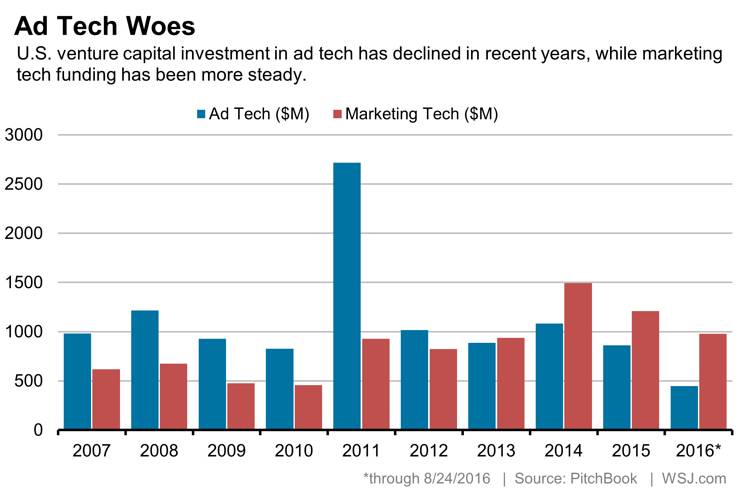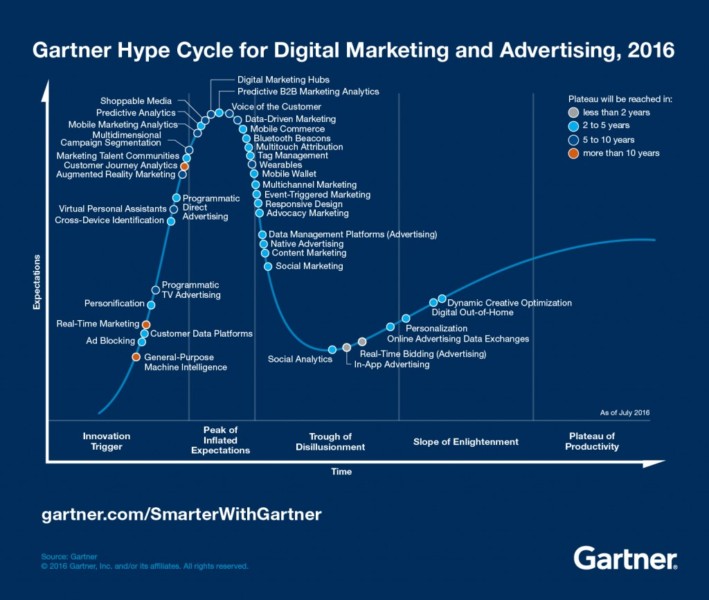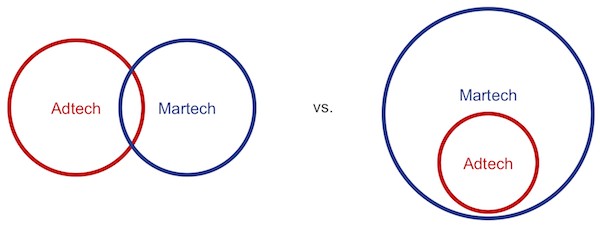
For the last few years, AdTech has been one of the most frequently discussed buzzwords in the digital media industry. Discussions have typically revolved around ad delivery, revenue optimization, new technologies such as header bidding, challenges such as ad-blocking and ad fraud, market fragmentation, the scope for consolidation, venture capital, mergers, and acquisitions… but now AdTech has a new contender.
Enter MarTech, short for Marketing Technology.
In this post, we look at this hardly new but increasingly popular trend, the difference and similarities between MarTech and AdTech, and the possibility of convergence in the future.
So, What is MarTech?
The email that landed in your inbox today from a brand was enabled by MarTech, so is the customer support you receive on social media channels, as well as most form of product promotion that is not paid advertising—for instance, a blog post created using a content management system and promoted using a social media scheduling service. It’s all marketing technology.
MarTech covers platforms and tools used by marketing and sales teams to manage and nurture leads, manage opportunities and customer contacts, funnel analytics and attribution. MarTech started within the enterprise with CRM systems such as Salesforce that streamlined sales and marketing in an organization and built efficiencies at the bottom of the sales funnel. Marketing automation systems such as Marketo, Hubspot, Eloqua, Adobe Campaign etc. sit on top of the CRM platforms and allow customers to scale and organize the enterprise’s ability to nurture leads. Given the prominence MarTech platforms always drive business outcomes in terms of increasing sales pipeline, predicting new leads for the pipelines and nurturing existing leads.
So to sum up, any technology that allows brands to interface with their existing customers or prospect new ones can be classified as marketing technology. But hey, wait a minute, isn’t advertising part of that? This is in fact the entire argument: To what degree is or isn’t advertising a subset of marketing?
MarTech Funding is on the Rise, AdTech in Decline
AdTech companies come in various shapes and sizes—there are ad networks, ad exchanges, ad servers, arbitrage agencies, optimization companies—and there are about as many payment models.
Compare that to MarTech companies, most of which run on a SaaS (software-as-a-service) model; it means their revenue model is more stable, predictable, and relatively immune to market fluctuations and other seasonal or situational factors that may affect the typical ad tech company. No wonder then that investors are beginning to see MarTech companies as a better bet.

U.S. venture-capital firms invested around $860 million in ad tech firms last year, the lowest amount since 2010 and down considerably from a peak of more than $2.7 billion in 2011, according to venture capital and private equity data company PitchBook. So far this year, only $446 million has been committed, on pace for the lowest funding level since 2005.
But PitchBook data suggest U.S. venture capital investment for marketing technology companies has been steadier, reaching over $1.2 billion last year. Investment this year was already close to $1 billion by Aug. 23, according to PitchBook, on pace to surpass last year.
Not everyone agrees that the difference in billing structure is the one constant that marks a distinction between MarTech and AdTech though. Directly responding to the feature by WSJ above, Dave Helmreich of LiveIntent explains that we shouldn’t rely on such oversimplifications to explain why investors are choosing to invest in MarTech.
Don’t get me wrong. This is a really interesting and thoughtful article […] but to assert that you are MarTech because of your billing model is ridiculous and specious reasoning.
What truly separates adtech and martech is more nuanced, and reducing that categorization to a billing model is a sacrifice the industry shouldn’t have to make.
With advertising, and with adtech, brands and marketers dive into the void of media and attention and begin prospecting and promoting awareness. This is sharply contrasted with marketing, which is defined by its precision and its known customers and first party data sets, and which is usually associated with its lack of scale.
Marketing implies continuing a relationship with a known person, rather than shots in the dark. Advertising is more transactional: driving impressions, click-through rates, frequency, etc. Marketing is more artisanal: reaching known people and pushing known data into systems that allow the brands and marketers to close the loop when it comes to measurement and attribution.
Will MarTech and AdTech Converge?
What’s the future of these two technologies? Will they ever come together as one function? Or will they just continue to diverge further? Well, expert opinion is divided, and in at least one instance, people have actually changed their previous stance.
Every year, Gartner releases its Hype Cycle to track the evolution of various upcoming technologies, last year was the first time they released a separate one combining both digital marketing and advertising technologies. In itself, this can be taken as a sign of how inexorably linked these both functions are, something that was reiterated by their accompanying press release statement.

Marketers’ growing dependence on data-driven strategies and tactics continues to drive a convergence of martech and adtech. Both have a growing dependence on data-driven strategies and tactics. At the strategic level, this convergence is the result of a continuing focus on delivering compelling and valued customer experiences, regardless of the market or the product or service. Product categories such as data management platforms (DMPs), marketing analytics, marketing automation and predictive analytics are increasingly shared in Martech and Adtech stacks.
Simple enough then, yes? Not so fast, looks like since the time this report was released, Gartner’s VP of Research has changed his stance on the subject.
Two years ago, Gartner analyst Marty Kihn predicted that owned media (mar tech) and paid media (ad tech) technologies would come together (mad tech). But now he’s having doubts.
“It’s a nice, logical, picture. But I changed my mind,” Kihn said.
Instead, he predicts ad tech will grow up in a “parallel universe” to mar tech. The two will meet only in one place: “The nexus will be identity and analytics,” he said.
Joe Stanhope, VP and Principal Analyst of research firm Forrester, however, doesn’t agree with this assessment, drawing conclusion from a new convergence report they published.
Some reactions to looming convergence approach satire, sometimes even intentionally. Like the war room bound leaders in Dr. Strangelove, we wonder: Are we heading for mutually assured destruction? Is somebody harboring a doomsday device? Have our deterrents been rendered useless? Which side will strike first? Who’s really in charge?
It’s tempting to conflate disruption with apocalyptic outcomes, but our research clearly shows that 1. convergence is not a zero-sum game, and 2. marketers need to proactively manage convergence to reap the benefits.
While everyone is arguing whether MarTech and AdTech will converge, in a column republished on AdAge, Scott Brinker of chiefmartec.com questions how different they are to begin with.

…what defines adtech? To state the obvious: adtech is simply technology that helps marketers and agencies manage advertising. At least advertising that we don’t think of as a special case of something else, like social media marketing. And it’s all a part of the broader martech universe — technology that helps with marketing of any kind.
Admittedly, that definition is fuzzy, because the technology we use in advertising is often valuable in other facets of marketing too. DMPs are the perfect example of this.
But that’s why semantic arguments about adtech and martech are dysfunctional. There is no border between the two that actually matters to a business or, more importantly, to its customers. It’s just a label.
What All This Means for You
The takeaway depends on who you are.
If you’re an entrepreneur and looking to raise funding for your new venture, most analysts agree that MarTech is just a better space to be in now, the consensus is that venture capitalists are just more open to the idea of investing in MarTech as compared to AdTech, which according to many is entering a period of lull.
If you’re a web publisher, nothing much changes for you because your goals are still the same, i.e., build your audience and monetize your website, you still need to promote your content and increase your revenue, something you need both MarTech and AdTech for, it’s not an ‘either or’ scenario for you.
If you’re an advertiser, this may be a good time to think about how much you want to invest in paid advertising (AdTech) as opposed to in-house content (MarTech), any sufficiently large brand cannot do without both, and some brands (such as Amex with OpenForum) have seen outstanding returns on content marketing.

Shubham is a digital marketer with rich experience working in the advertisement technology industry. He has vast experience in the programmatic industry, driving business strategy and scaling functions including but not limited to growth and marketing, Operations, process optimization, and Sales.





![28 Best Supply Side Platforms (SSP) for Publishers in 2024 [The Complete List] Supply Side Platforms](https://www.adpushup.com/blog/wp-content/uploads/2022/05/undraw_chore_list_re_2lq8-270x180.png)

